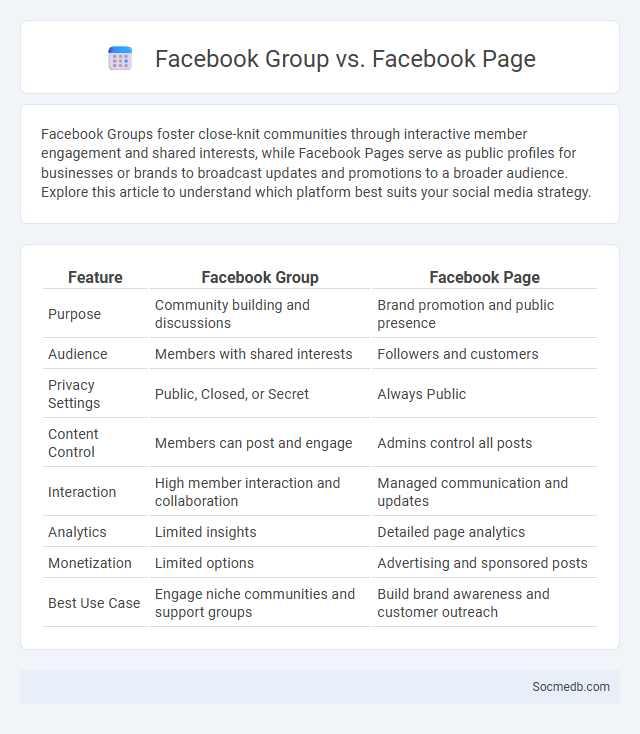
Photo illustration: Facebook Group vs Facebook Page
Facebook Groups foster close-knit communities through interactive member engagement and shared interests, while Facebook Pages serve as public profiles for businesses or brands to broadcast updates and promotions to a broader audience. Explore this article to understand which platform best suits your social media strategy.
Table of Comparison
| Feature | Facebook Group | Facebook Page |
|---|---|---|
| Purpose | Community building and discussions | Brand promotion and public presence |
| Audience | Members with shared interests | Followers and customers |
| Privacy Settings | Public, Closed, or Secret | Always Public |
| Content Control | Members can post and engage | Admins control all posts |
| Interaction | High member interaction and collaboration | Managed communication and updates |
| Analytics | Limited insights | Detailed page analytics |
| Monetization | Limited options | Advertising and sponsored posts |
| Best Use Case | Engage niche communities and support groups | Build brand awareness and customer outreach |
Understanding Facebook Groups: Definition and Purpose
Facebook Groups are online communities designed for users to connect around shared interests, goals, or activities. They facilitate focused discussions, collaboration, and resource sharing among members, fostering a sense of belonging and engagement. These groups can be public, closed, or secret, allowing for varying levels of privacy and content control.
What Is a Facebook Page? Key Features Explained
A Facebook Page serves as a public profile specifically designed for businesses, brands, celebrities, and organizations to connect with their audience on the platform. Key features include the ability to post updates, share media, engage with followers through comments and messages, and access insights for tracking user interaction and reach. Facebook Pages also support advertising campaigns, event promotion, and integration with other social media tools to enhance online presence and marketing efforts.
Facebook Profile vs Group vs Page: Core Differences
Facebook Profiles represent individual user identities, allowing you to connect with friends, share personal updates, and manage privacy settings. Pages serve businesses, brands, and public figures, offering tools for advertising, analytics, and broader audience engagement. Groups emphasize community interaction, enabling members to participate in focused discussions and share content within a more private or niche environment.
Community Engagement: Groups vs Pages
Social media community engagement thrives through active participation in both Groups and Pages, each serving unique purposes. Groups foster direct interaction and deeper connections by allowing members to share ideas, ask questions, and collaborate within a focused environment, enhancing your network's loyalty and trust. Pages, on the other hand, provide a public platform to broadcast updates, events, and brand messages, driving broader reach and visibility among your target audience.
Content Management: Comparing Group and Page Controls
Group controls on social media offer you more interactive features such as member approval, post moderation, and topic-specific discussions, ideal for fostering community engagement. Page controls prioritize brand consistency with tools for scheduled posts, analytics, and ad management, making them suitable for marketing and public outreach. Choosing the right platform depends on whether your priority is community interaction or brand promotion.
Privacy Options: Open, Closed, and Secret Groups
Choosing the right privacy option for your social media group significantly impacts your community's visibility and member access. Open groups allow anyone to view and join, fostering maximum engagement and content sharing, while closed groups require approval to join, offering a balance between accessibility and controlled membership. Secret groups provide the highest privacy by hiding the group and its content from non-members, ensuring your conversations remain confidential and exclusive.
Branding and Business Use: Pages vs Groups
Social media platforms offer distinct tools for branding and business development, with Pages providing a public profile ideal for establishing authoritative brand presence and reaching broad audiences through targeted ads and analytics. Groups foster community engagement by enabling direct interaction, feedback, and loyalty among members, making them effective for customer support and niche marketing. Leveraging both Pages for visibility and Groups for community-building maximizes brand impact and business growth on social networks.
Audience Reach and Algorithms: Page vs Group Visibility
Social media algorithms prioritize content differently between pages and groups, impacting audience reach and engagement. Pages benefit from broader visibility through news feed placements and paid promotions, while groups typically foster higher organic interaction by targeting niche communities with tailored content. Optimizing content strategy for each format enhances visibility by leveraging algorithmic preferences--pages maximize reach via consistent posting and ads, whereas groups thrive on active member participation and relevant discussions.
Monetization Opportunities: Group vs Page
Social media monetization opportunities vary significantly between groups and pages, with pages offering direct avenues such as sponsored posts, affiliate marketing, and ad placements through platforms like Facebook and Instagram. Groups foster deeper community engagement, enabling You to leverage trust for exclusive content, membership fees, or niche product promotions tailored to highly interactive audiences. Choosing between group and page monetization depends on your content strategy, audience interaction levels, and revenue goals for maximizing financial returns.
Choosing the Right Platform: Group, Page, or Both?
Choosing the right social media platform depends on your goals, audience, and content strategy; groups foster community interaction and engagement through discussions, while pages provide a professional presence with easy updates and branding opportunities. Your choice should align with where your target audience spends time and how you want to manage communication--groups encourage peer-to-peer connections, whereas pages serve as a broadcast channel for information. Combining both can maximize reach and engagement, allowing you to build a community while maintaining a polished public profile.
 socmedb.com
socmedb.com